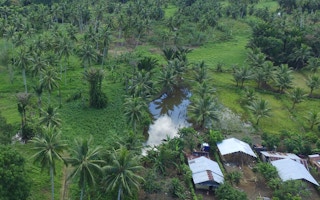Recent global just energy transition approaches that promise zero-carbon development, particularly the Just Energy Transition Partnerships (JETP), are still predominantly top-down. This is despite studies showing that a bottom-up approach will be essential for a just transition.
Principally, the partnerships are political agreements between some countries of the Global South, including South Africa and Indonesia, and those of the Global North, such as the United States, the United Kingdom, Japan, and the European Union. The agreements mainly promise significant financing from the latter group of countries for the former, ‘coal-dependent’ economies to commit further to low or even zero-carbon development by moving away from coal.
Indonesia’s JETP deal promises ‘green’ funding worth US$20 billion, to support the archipelagic country’s endeavors to establish a more sustainable economy – especially cleaner electricity generation. The inauguration of the JETP secretariat at Indonesia’s Ministry of Energy and Mineral Resources in February demonstrates the seriousness with which this initiative is being embraced.
The target of this agreement is quite ambitious: increasing the production of renewable energy and ‘euthanising’ coal-fired power plants in Indonesia, which are claimed to be climate-unfriendly. Unfortunately, these targets face several challenges.
Firstly, the JETP sits in an ambivalent regulatory atmosphere. While the green partnership was agreed, the production of renewable energy in Indonesia is somewhat sluggish, on average, not exceeding two per cent of its total potential. Moreover, coal is still Indonesia’s primary export, currently contributing to 5-6 per cent of the national GDP – a significant number for a single industry to contribute to the total economy.
Secondly, and perhaps more importantly, the JETP approach tends to be top-down. In Indonesia, discussions on just energy transition issues only take place within elite policymaking and donor circles. So far, there has not been any apparent involvement of the general public, and little, if anything, is known of how the JETP could engage with and gain support from local communities. And yet, involving local communities, and drawing on their knowledge and experience, is essential in the quest for successful policymaking in Indonesia.
“
By involving local organisations, the community is not merely an audience or target for the energy transition agenda, but an involved actor with significant ownership, agency, and contribution to Indonesia’s energy transition ambitions.
Specifically for energy transition, various studies also show that the success of such endeavors is significantly due to bottom-up approaches. Research in Germany and in Spain, for example, show positive developments in the energy transition in these countries because of the support – mainly by the will and action – of grassroots communities who consciously wanted to reduce their electricity and heat consumption and increase demand for renewable energy supplies. The demands of the people in a communal and participatory manner, to some extent, succeeded in mainstreaming the issue of creating a new, sustainable energy system.
Of course, the energy crisis and climate change are now two of the most pressing challenges of our time, with human lives increasingly at stake. The JETP and other climate initiatives presents great hope for countries like Indonesia to successfully navigate these challenges. But this agenda needs to be transformed into policies that reach the grassroots level.
Stakeholder elites, especially in political parties, government departments, and international donor organisations related to JETP, need to seriously formulate a robust community involvement process, for example through local influential groups. In Indonesia, these groups include Islamic groups like Nahdlatul Ulama and Muhammadiyah which are influential in almost every aspect of policymaking, including climate change. Therefore, some of the JETP funding needs to be used to increase the participation of the general public and local communities.
For instance, money can be used to form village electricity cooperatives dealing in renewable energy, similar to the Som Energia cooperative in the Girona region of Spain which has successfully developed renewable energy projects from solar, wind and hydro. Such energy cooperatives have shown local communities that renewable energy is accessible to them.
The electricity cooperative approach is not new to Indonesia and have been applied in villages across the country. However, the co-op model has not developed effectively due to various technical and managerial problems which has rendered them uncompetitive. To this end, with funding support and guidance from JETP, cooperatives could become a grassroots approach worth re-examining. More broadly, initiatives based on local wisdom for the energy transition need to be supported. Research in energy transition undertaken by some local researchers have emphasised the importance of the bottom-up approach for an effective transition.
By involving local organisations, the community is not merely an audience or target for the energy transition agenda, but an involved actor with significant ownership, agency, and contribution to Indonesia’s energy transition ambitions. In this sense, approaches based on local knowledge and wisdom can make the energy transition truly just and impactful for the communities for which they are intended.
Muhamad Rosyid Jazuli and Penlope Yaguma are PhD candidates at University College London’s Department of Science, Technology, Engineering, and Public Policy.










